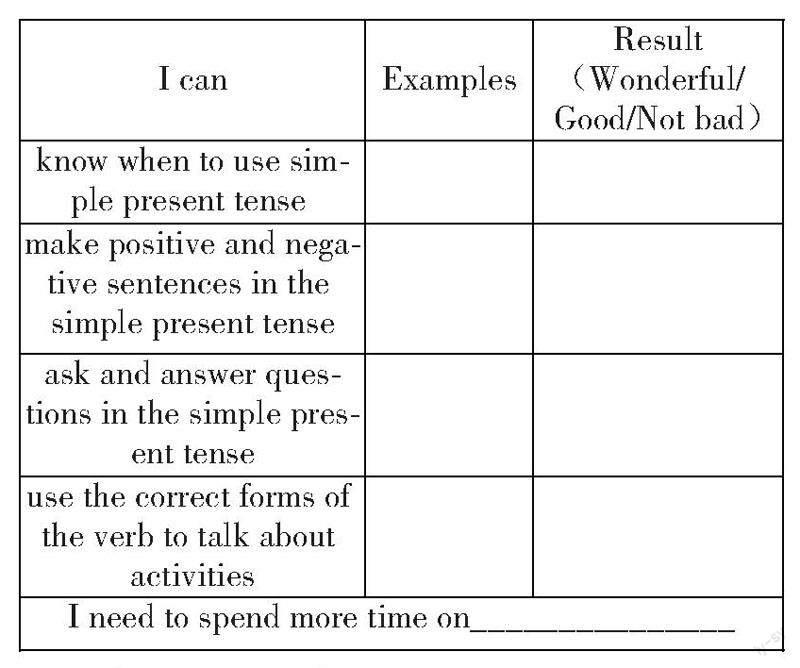以学定教,践行问题导向
陈松


一、教学准备
1.教材分析
《义务教育英语课程标准(2022年版)》明确指出,秉持在体验中学习、在实践中运用、在迁移中创新的学习理念,倡导学生围绕真实情境和真实问题,激活已知,参与到指向主题意义探究的学习理解、应用实践和迁移创新等一系列相互关联、循环递进的语言学习和运用活动中。坚持学思结合,引导学生在学习理解类活动中获取、梳理语言和文化知识,建立知识间的关联。坚持以评促学、以评促教,注重发挥学生的主观能动性,引导学生成为各类活动的设计者、参与者和合作者。
为进一步探索问题导向的学、思、练语法课堂,笔者以译林版牛津英语教材七(上)Unit 2语法课为例,解决教学难点。该单元强调的是“人与自我”,核心话题是讨论、分享与运动有关的内容。语法板块的功能是梳理本单元出现的重点语言现象,帮助学生更好地掌握语法规则,使其在语境中开展学习,迁移知识,运用所学。
2.教法分析
以学定教,践行问题导向的学、思、练语法课堂教学主要分为以下几个步骤:基于课程标准,精心设计课前练习;基于学生起点,精准规划课堂教学活动;基于学生特点,提供自测评价反馈单。
3.教学目标
本课例擬通过一课时完成教学,让学生能在学习结束时达成以下目标:在语境中理解行为动词一般现在时的用法;在语境中掌握行为动词一般现在时的肯定句、否定句、疑问句以及肯定和否定回答的基本用法;围绕本单元主题,在语境中运用一般现在时进行交流。
二、教学过程
1.围绕单元主题,精心设计课前练习
一般现在时的句型在小学四年级已反复出现,七年级学生对其并不陌生。因此,基于学情设计课前练习,教师应当准确把握学生学习起点,充分发挥学生主观能动性,践行学思结合,让学生成为课堂教学活动的主人。
本单元的主题为“让我们一起运动”。为准确把握本课时教学起点,相关课前练习应紧密围绕“运动”主题展开,从而引导学生围绕主题解决问题,激活已知,发现认知差距,形成学习期待。课前练习设计如下:
(1)Which of the following refer to present events? Tick the correct boxes.
□My friend does well in swimming.
□They often played football after school last term.
□Look, he is jogging in the park.
□We usually take a walk after supper.
□He will play in the Huanghe Football Club next year.
(2)Use correct forms to fill in the following blanks.
Most people say sports________(be) for young people, but my grandparents________(not think) so. My grandpa is 72 years old and he________(like) swimming and running. He likes ball games too. He often_______(play) tennis in the afternoon. My grandmother is 69 years old. She often_______(dance) after dinner on the square. My grandparents both_____(play) table tennis in their free time. My grandmother says doing sports can make her healthy, but now she _______(not have) enough time to exercise every night. She likes Yangko now.
【设计意图】围绕单元主题设计课前练习,让学生在主题语境中完成相关练习,激活已知。教师根据本班学生课前练习反馈确定教学内容,为接下来的课堂语法教学找好起点,将传统的教师讲授型课堂转变为以学生学、思、练为一体的素养型课堂,让语法课堂的学习更高效。
2.基于学生起点,精准规划课堂教学活动
根据课前测反馈结果来看,95%的学生可以适应一般现在时的使用语境,对该时态的概念掌握较好,能在不同时态中准确分辨出一般现在时的用法。在课堂教学中,应基于学情,明确教学重点,通过活动引导学生在真实情境中梳理语言现象,归纳语法规则,积极参与指向主题意义探究的语言学习和运用活动,从而提升素养,发展能力。
(1)Presentation
T: You did some exercises about simple present tense yesterday. Everybody did a very good job. But there are a few mistakes. Its very common to make mistakes at first. Today, lets try to find out and solve them together.
【设计意图】坚持问题导向,直接呈现昨日练习中的问题,鼓励生生互动,让学生成为各类评价活动的参与者和合作者。问题导向的课堂能让学生尽快投入课堂学习,主动发现问题,学会思考,让学习真正发生。
(2)Analysis
T:Now you have found out these mistakes. Can you work in pairs to analyze the reasons for these mistakes?
S1: They dont know how to change “y” into “s”.
S2: Maybe they dont know the differences between vowels and consonants.
【设计意图】发现问题、识别问题后,错误产生的原因须进一步分析和明确。教师再次引导学生通过互助分享、分析问题、梳理错因等方法,找出问题,避免再犯。和以教师直接讲授规则、学生被动听讲的传统课堂相比,通过生生互相发现—总结—分享,践行问题导向的学、思、练教学模式更容易被学生接受,学生学习成效较高,学习真正发生的概率更大。
(3)Work out the rules
T:Do you know how to add “s” to the verb? How many ways are there to add an “s”?What are they?Now can you work in groups of four to work out the rules and then write them down?
T: If you have finished, you can turn to page 23, and check out the rules with your group members.
【设计意图】课本第23页所要学习、呈现的内容在生生归纳和总结中完成。由生生互助梳理、概括与整合代替教师的讲授和归纳,更能调动学生积极性。学生作为主体参与语言活动,自主习得语言知识,在学习中取长补短,总结经验,充分发挥主体作用。
(4)Presentation
T: Now I think most of you have learned how to add “s”.
(5)Discussion
T: Everybody finished a diary about Millie and her family members favourite sports yesterday. Now, work in pairs to read the diary together. If you have some questions during reading, you can stop to discuss or raise up your hands and I will help you.
【設计意图】根据课前测情况得知,该部分内容尚有学生未掌握,设计此活动,可以帮助学生梳理行为动词的否定句和一般疑问句的用法。学生在具体的语境中学习语法知识,在活动中体验学习,在讨论中梳理、归纳所学语法的表达形式、使用功能和语用功能,反思错因。在此过程中,教师根据学生的表现和需求,及时提供帮助和反馈,通过观察、提问、追问等方式,确认学生学习是否真正发生。
(6)Practice
T: Today we knew something about Millie and her family members favourite sports. What about yours?Now, work in pairs to interview something about favourite sports with the help of the following blanks. During your interview, remember to use Wh-questions and Yes or No questions as many as you can.
[Favourite sports
I My dad My mom My
cousin My
grandpa My
grandma Like Dislike ]
T: Now, lets welcome some of you to present their interviews.
S1: Hello, I want to know something about your family members favourite sports and yours. Can you answer my questions?
S2: Sure.
S1: Whats your favourite sport?
S2: I like swimming.
S1: When do you often swim?
S2: I often swim at the weekend.
S1: Do yo like running?
S2: No, I dont like running. But my dad likes running very much.
S1: What else does he like?
S2: He likes playing basketball too.
S1: Which sport doesnt he like?
S2: He doesnt like playing tennis.
S1: Does your mom like playing tennis?
S2: No,she doesnt like it. She likes jogging with her friends.
S1: How about your grandpa and grandma? What sports do they like?
S2: My grandpa likes walking but he doesnt like running. My grandma likes dancing but she doesnt like running either.
【設计意图】练习能进一步促使学生在语言输出中体悟所学所练。初中英语语法教学应当尽可能保证学生在完整语篇和真实语境中接触、建构新知,并运用所学探究主题意义,提升语言技能。教师应有意识地组织学生在课前复习一般现在时,完成相关练习,找出差距;在课中反思、总结一般现在时用法,巩固所学;在生生对话中运用所学、建构新知,在语境中运用所学语法知识理解和表达意义。
(7)Mini-writing
T:In this class, we talked about and shared something about our favorite sports. At last, I think all of you can write down something about your and your family members favourite sports. Now, lets write down something about it according to the table above.
【设计意图】讨论后的微写作可帮助学生在写作输出中再次体会、练习行为动词一般现在时的用法,巩固当日所学,在语境中学会正确运用、表达。在学生当堂写作时,教师应及时巡视,收集学生是否学会的一手数据,发现学生问题后,及时给予帮助,让学生体验学习的收获。
3.基于学生特点,提供自测评价反馈单
T:Today we learned the simple present tense together. At the end of the class, I want to make sure how much you learned about it. Now, according to what you have mastered , try to fill in the following self-assessement.
[
I can
Examples Result
(Wonderful/Good/Not bad) know when to use simple present tense make positive and negative sentences in the simple present tense ask and answer questions in the simple present tense use the correct forms of the verb to talk about activities I need to spend more time on_______________ ]
【设计意图】以课前测了解学情为起点,到基于学情的以学定教,构建以学生为主体的学、思、练的课堂模式,能有效帮助学生在活动中发现差距,逐渐从感性认识上升到理性认识。知识的习得仅靠课后练习或单元试卷无法全面检测和评价。课堂教学是评价实施的重要载体。因此,在学生经过讨论、分析、总结、练习本节课难点内容后,通过学生自评单的完成情况,教师可以评估本节课学习内容掌握的程度以及进一步练习的精准度等。教师应指导学生学会通过自评单,反思当日所学,评价学习效果,形成正确的学习方法和策略。
三、教学反思
实践证明,以学定教、践行问题导向的学、思、练语法课堂能通过多形式活动,帮助学生发现问题、反思问题、解决问题,让语法课堂更真实、更高效,问题解决更有针对性,真正帮助学生学会语法知识,学用语法现象,增强语法意识,提升语用能力,为进一步学好英语、用好英语做好铺垫和准备。
(作者单位:江苏省南京市宁海中学分校)

